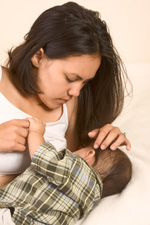Impetigo is a skin infection and usually looks red with a dried crusty honey colored discharge. It tends to spread. The usual treatment is an antibiotic cream such as BACTROBAN. For severe cases, I will also use an oral antibiotic.
I commend you for choosing to breastfeed and sticking with it. Your baby will be much healthier as a result. I am sorry that your doctor is so negative. When I don’t agree with a patient’s philosophy, I try to just be quiet – not antagonistic… YES, YOU CAN CONTINUE BREASTFEEDING, even with a breast rash.
What you really need to do is find a good certified Lactation Consultant to help you diagnose your rash. It is difficult to tell you what it is via e-mail, but it is very possible that it is a yeast problem. Here is some information about yeast on the breasts:
Candida (Yeast or Thrush) Infection on Nipples
Candida (also called yeast, monilla or thrush) is a fungus that thrives in warm, dark, moist environments, such as the mucus membranes of the mouth and vagina, the diaper area, skin folds, bra pads, and on persistently wet nipples.
Suspect candida as the cause of your sore nipples if:
- Your nipples are extremely sore, burning, itching, red, or blistery.
- You experience shooting pains in your breasts during or just after feeding (especially during your milk ejection reflex).
- The usual remedies for sore nipples aren’t working.
- Baby has oral thrush (white, cottage-cheese-like patches on the tongue and sides of the mouth) and/or a yeasty diaper rash.
- Your nipples suddenly become sore after a period of pain-free breastfeeding.
- You are taking, or have just finished taking, a course of antibiotics. Yeast infections are common following antibiotic treatment.
Here are some simple suggestions that may help prevent a yeast infection on your nipples, or cure a mild case of yeast infection, or what you are describing as a breast rash:
- Yeast organisms hate sunlight, so give your bra and breasts a sun bath. Expose your nipples to sunlight for several minutes several times a day. After washing them, dry your bras in the sunlight.
- Air-dry your nipples after each feeding
- Avoid plastic-lined breast pads that irritate skin and trap leaked milk.
- Change nursing pads after each feeding.
- Wear 100 percent cotton bras and wash them daily in very hot water.
- Thoroughly wash pump parts that come in contact with your breasts in a bleach solution and boil them in water for five minutes daily.
Treating Breast Rash Candida: Infection of the Nipple
If the simple home remedies listed above don’t bring relief, consult your healthcare provider about the following treatments:
- Apply an antifungal cream (mycostatin, clotrimazole, myconazole) to your nipples as suggested or prescribed by your doctor.
- If you have a candida infection in your nipples, baby should be treated for thrush even if you can’t see any white patches in the mouth. Your healthcare provider will prescribe an oral antifungal suspension that should be painted on baby’s tongue, roof, and sides of the mouth three or four times a day for a couple of weeks.
- If baby has a candida diaper rash, treat it with an over-the-counter antifungal cream.
- Eat lots of yogurt (the kind with live active cultures) and take oral acidophilus. This encourages good bacteria to live in your gut and discourages the growth of yeast.
- If your baby has thrush but your nipples are not yet sore, apply the prescribed medicine to baby’s mouth just before feeding so that your nipples get the preventive benefit of the medication as well.
- If your healthcare provider advises you to wash the creams off your nipples prior to breastfeeding, do so gently with warm water.
- While nursing on a candida-infected nipple can be extremely painful, it is necessary to keep the affected breast empty to prevent mastitis, or even a candida infection deeper into the breast tissue. Pay particular attention to proper latch-on and easing your baby off your nipples at the end of the feeding, since infected nipples are more sensitive and prone to injury from improper sucking patterns.
Yeast infections can be very persistent. Use the full course of medication suggested by your doctor, and continue using the home remedies for several weeks so that the breast rash / infection will not reoccur. Click here for more information on treating sore nipples.
Dr. Jim

